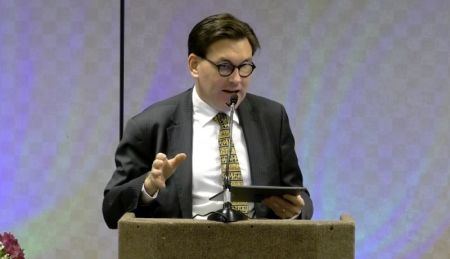Catholic Law School Admin. Resigns Over Controversial Comments on Women, Gay Marriage

An administrator at the Oklahoma University College of Law has stepped down from his administrative roles amid backlash to comments about women and same-sex marriage from his 2014 book on Catholic life in a secular age.
Brian McCall, the college of law's associate dean for academic affairs and associate director of the college's law center, voluntarily resigned from his administrative positions this week after concerns about views expressed in his book To Build the City of God: Living as Catholics in a Secular Age led to an independent investigation from the school's Equal Opportunity Office.
In a chapter of McCall's book titled Modest Contact With the World: Women in Pants and Similar Frauds, McCall makes the argument that the act of women wearing pants is akin to "sin."
"Women must veil their form to obscure its contours out of charity toward men," McCall reportedly wrote in the book, according to the OU Daily. "To know that women in pants have this effect on men and to wear them is thus a sin against charity as well as modesty."
McCall also reportedly condemned the idea of women entering the workplace as "another false promise of the devil come to pass."
The book also referred to same-sex marriage as "insanity."
"A society that cannot distinguish between a marriage and a perversion of nature has lost all grip on reality," McCall wrote in the book.
In a statement Tuesday, College of Law Dean Joseph Harroz Jr. sent out a statement explaining that McCall has resigned from his administrative positions even though the independent review "uncovered no evidence of workplace harassment or discrimination." McCall had worked for more than 13 years at the university.
"The OU College of Law is a place of inclusion. Beyond ensuring the college is free from illegal harassment or discrimination, the college must prepare tomorrow's leaders — our students — for the world in which they will serve," Harroz's statement reads. "It would be a disservice to them if we did not provide an educational experience that presents diverse subject matter, encourages thoughtful conversation and debate, and prepares them to practice in an increasingly diverse world."
McCall told the New York Daily News that he was "saddened" by the situation and asserted that he was "troubled by the hypocrisy" in higher education.
"People should be evaluated on the merits of what they do, not what they believe and who they are," he added.
McCall's resignation comes as the OU Board of Regents policy on academic freedom allows for faculty members to publish whatever they like so long as it doesn't interfere with their school duties.
However, McCall's work as an administrator is not necessarily protected under the policy, according to Cary Nelson, a University of Illinois Professor Emeritus and former president of the American Association of University Professors.
"As a faculty member, (McCall is) covered," Nelson told OU Daily, adding that the OU policy is based off the AAUP's Statement of Principles on Academic Freedom and Tenure. "Academic freedom protects him from any reprisals. The problem is that he's an administrator, and those statements are still protected, but there is one form of sanction that he's not protected against, and that is removal from his administrative position."
In addition to his work with the university, McCall serves as an editor for the traditionalist Catholic publication Catholic Family News. The organization is among many faith-based conservative organizations labeled by the far-left Southern Poverty Law Center as a "hate" group.
One of McCall's former students, Breanna Kay, came to McCall's defense in a Facebook post even though she admits she does not agree with his "sociological, theological, or political views" on women.
"What I can say, with all certainty, is that Brian McCall was the dean over the paralegal program during my time at OU. He was also my professor. This is a program made up, almost entirely, of women with families who have no other aim but to enter the workforce as a paralegal, outside of the home," She wrote. "Every one of us wore pants. I generally had my eyes caked in black eyeliner and bright lipstick. This man was never anything but kind, fair, and extraordinarily helpful to me as a student."
Kay added that she never felt discriminated against in any way in his class or during her encounters with him as an administrator.
"He is one of the brightest people I have ever met and I gained as much from his instruction and input into my career as I have with many other professors who share my viewpoints on the world," she said. "I was never looked down upon because I was a woman, and he did everything in his power to prepare me to be a career woman 'outside of the home.'"





















